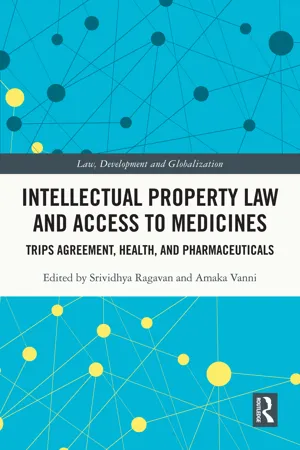1World Trade Organization
A Barrier to Global Public Health?
Srividhya Ragavan
Introduction
“The World Health Organization Draws Flak for Coronavirus Response,” read the headline of the Wall Street Journal on February 12, 2020.1 The global struggle with the coronavirus pandemic has highlighted two things: first, the importance of medication; second, the need to access health care and medication. With tens of thousands of individuals infected with COVID-19, and a death toll spreading into almost all countries, the International Health Regulations Emergency Committee of the World Health Organization (WHO) declared this virus a “public health emergency of international concern.” Disruptive global epidemics – such as the AIDS, ebola, and SARS – have time and again raised the issue of global response and preparedness to pandemics.2 While the WHO continues to be at the center of the debate, the role of the World Trade Organization (WTO) remains crucial in proactively preventing or addressing epidemics and pandemics.3 The harmonized trading system of the WTO was built on an underlying assumption that egalitarian access to health is a barrier to trade and that disparate access to health was the solution to innovation. Considering that a public health crisis in one part of the world can affect global trade in unimaginable ways, protecting public health has become the threshold to protect global trade.
In the face of a global pandemic, access to health care and medication is the one paradigm that can alleviate many global concerns, including those involving and relating to trade such as employment, travel, and more. Lack of medications – either from lack of availability of medication or lack of access – can catapult a possible national public health issue into an international global health crisis. In turn, a global health crisis can affect several industries in ways otherwise unimaginable. Hence, there is a need for balance between innovation and access. The role of the WTO as the gatekeeper for eliminating trade barriers while preserving access to health-care remains important in taking a strategic leadership position for health-related matters. If global productivity is affected due to lack of access to available medication, global trade suffers as a consequence. Despite this reality, the WTO has remained normative and divorced from the real impact of local realities on larger health issues. Its stature as a global organization notwithstanding, the WTO has shown a remarkable tendency to succumb to unrealistic rhetoric and pressures from corporate interests and powerful countries that have shown susceptibility to pandering by powerful trade lobbies. Consequently, the WTO has been irrelevant in ensuring access to medication as a means to strengthen productivity and global trade.4
It Began with the Original Draft
When the WTO was established, the TRIPS Agreement mandated that countries provide product patent protection as part of the required minimum standards.5 At that time, developing countries vociferously pointed to local realities to highlight that the TRIPS Agreement would be detrimental to accessing lifesaving medication in poorer members. Moreover, poorer countries criticized the TRIPS Agreement for not considering their resource restraints before enforcing the establishment of the patent regime. The main criticism against the TRIPS Agreement was that the harmonization effort did not provide for – nor did it factor in – issues of national import. Weaving adequate flexibility to allow countries at different stages of economic growth to balance between “incentives to create and the benefits of free competition” was an important aspect that the TRIPS agenda overlooked.6 The overwhelming reality was that the minimum standards set forth in the TRIPS Agreement represented a maximalist approach.7
Particularly, the TRIPS Agreement's approach to access to medication was criticized for not taking the objectives and principles of the Agreement into account. Article 7 of the TRIPS Agreement outlines objectives stating that the enforcement of intellectual property mechanisms should promote technological innovation and transfer of technology in a manner mutually advantageous to the social and economic welfare of the users.8 On a plain reading, Article 7 emphasizes the welfare paradigm by asserting that the international obligations of protection and enforcement of IP rights should contribute to the national, social, and economic welfare of members. The outlined objectives have been criticized for the primacy they lend to IP protection, and for not providing members with adequate flexibility to address national issues.9 The principles under which the objectives of Article 7 work are outlined in Article 8.10 Entitled Principles, Article 8 recognizes members' rights to adopt public interest or public health measures, provided they are consistent with the TRIPS provisions.11 Thus, Article 8 recognizes limitations on private rights under some circumstances. This article can also be viewed as limiting the policy-making rights of member states in a public health or public interest exigency.12 Operationally, the assertion of Article 7 to balance members' rights with obligations notwithstanding, the TRIPS Agreement was more effective in encouraging fulfillment of obligations than in enabling members to achieve public policy and national developmental goals. Consequently, the WTO faced considerable push-back, most significantly from health activists, patient groups, and nongovernmental organizations (NGOs), on the grounds that the innovation agenda did not address the question of providing global access to lifesaving drugs.13 Thus, the WTO draft did not give preference to access to medication.
WTO's Elitist Attitude Toward Epidemics
The establishment of minimum standards, with maximalist approach toward IP protection, characterized an inadequacy of the TRIPS Agreement in catering to issues such as balancing innovation with access to lifesaving medicines. For instance, during the early 1990s, the HIV/AIDS epidemic was ravaging the world at an unprecedented rate, particularly in developing countries. The patented medication, which cost $15,000–$20,000 per patient per year,14 remained inaccessible to many HIV/AIDS patien...
